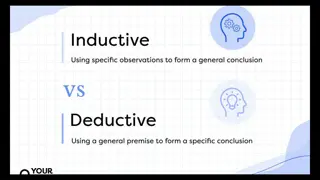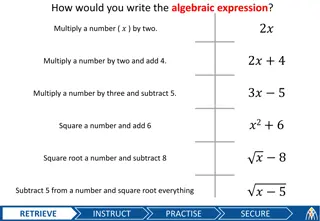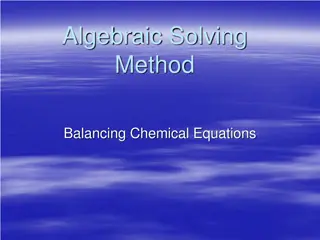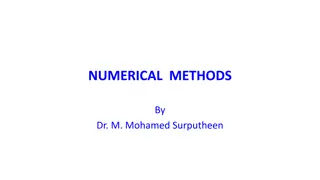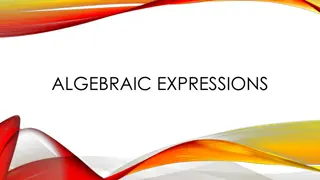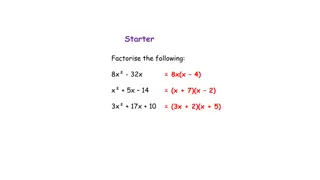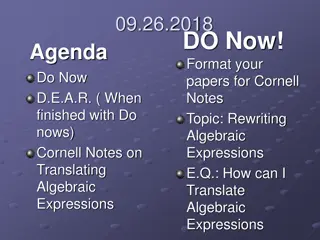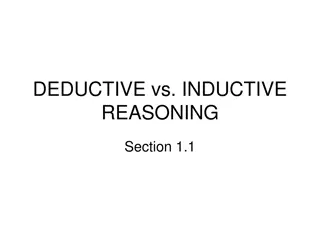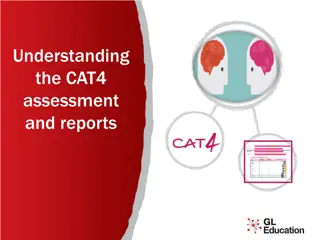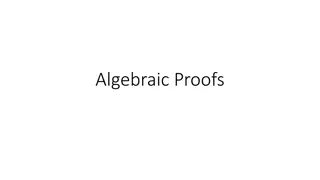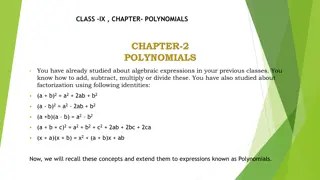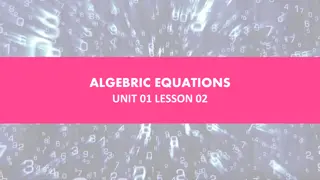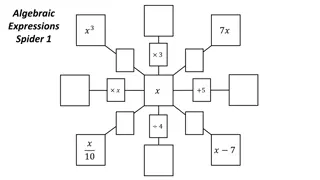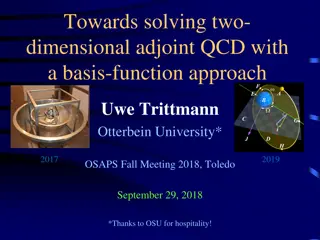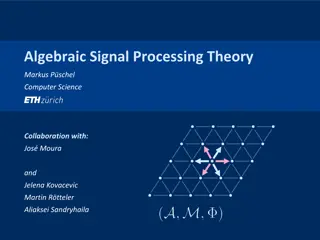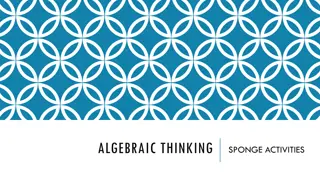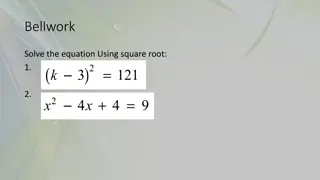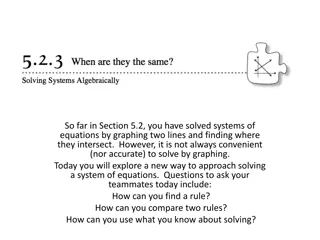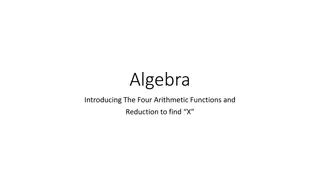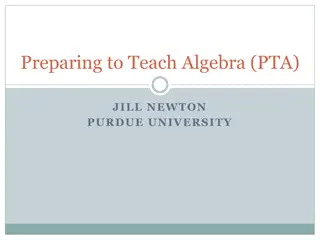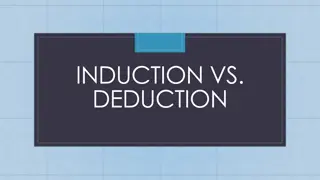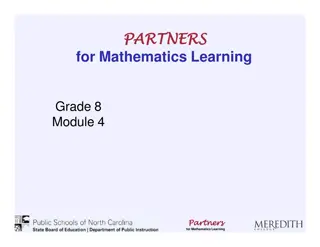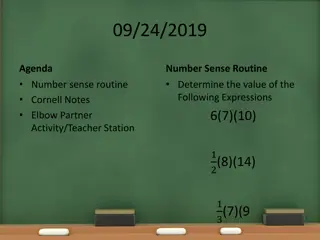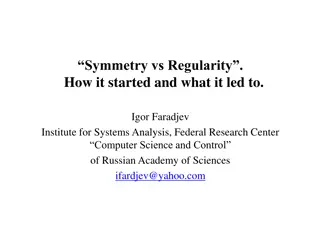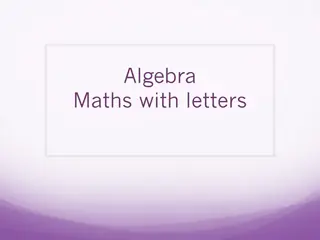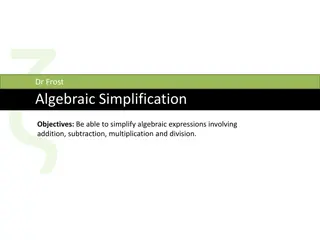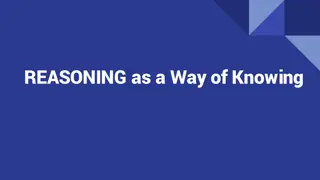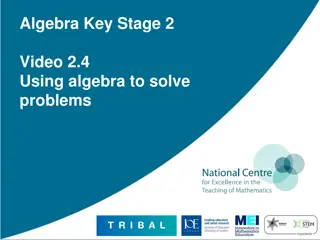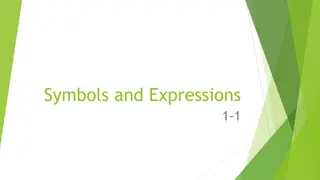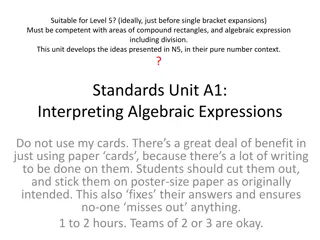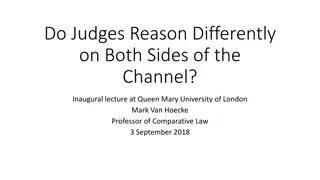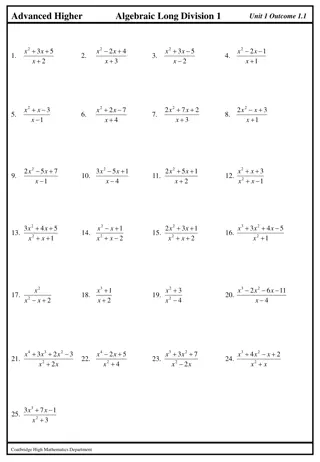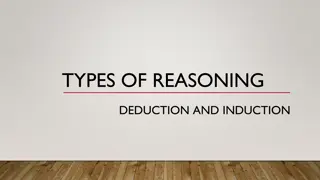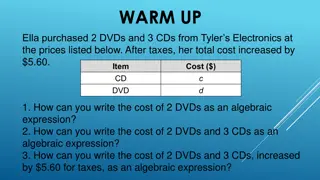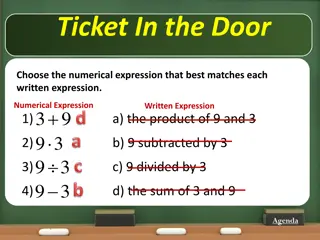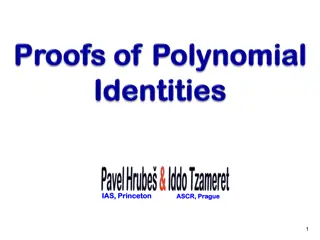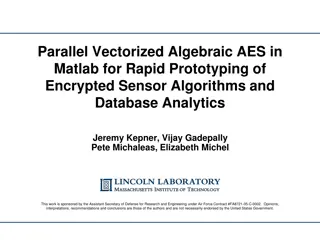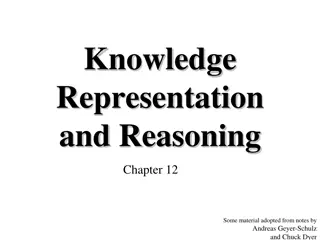Inductive and Deductive Reasoning
Inductive reasoning involves drawing general conclusions from specific observations, while deductive reasoning starts with general premises to derive specific conclusions. Induction uses experience or experimental evidence to make broad conclusions, while deduction follows from general to specific.
5 views • 7 slides
Mastering Algebraic Expressions and Formula Rearrangement
Learn to write algebraic expressions, manipulate formulas, calculate costs based on equations, and change formula subjects efficiently.
0 views • 14 slides
Balancing Chemical Equations Using Algebraic Solving Method
Learn how to balance chemical equations using the algebraic solving method step-by-step by assigning variables to compounds and solving for each variable. This comprehensive guide takes you through the entire process, from assigning variables to simplifying fractions and substituting values back int
1 views • 9 slides
Numerical Methods and Errors in Computation
Delve into the world of numerical methods through the guidance of Dr. M. Mohamed Surputheen. Explore topics such as solving algebraic and transcendental equations, simultaneous linear algebraic equations, interpolation, numerical integration, and solving ordinary differential equations. Learn about
0 views • 130 slides
Algebraic Expressions: Variables, Coefficients, and Constants
Explore the difference between numeric and algebraic expressions, learn about the components of algebraic expressions - variables, coefficients, and constants. Discover how to identify variables, coefficients, and constants in expressions. Classify algebraic expressions as monomials, binomials, or t
0 views • 20 slides
Algebraic Fractions Simplification Techniques
Explore how to factorize and simplify algebraic fractions using common techniques such as factorization, canceling common factors, and multiplying/dividing fractions. The process involves identifying factors, canceling where possible, and performing operations to simplify expressions. Checkpoints an
0 views • 15 slides
Mastering Algebraic Expressions: Translating Words to Equations
Learn how to translate word phrases into algebraic expressions for addition, subtraction, multiplication, and division. Understand the key phrases associated with each operation to write expressions accurately. Enhance your skills in rewriting algebraic expressions with practical examples and concis
4 views • 17 slides
Deductive Reasoning and Problem Solving in Logic
Explore the concepts of deductive reasoning, problem-solving logic, and Venn diagrams in this informative content. Learn about the process of drawing conclusions from known facts, using syllogisms to make valid arguments, and understanding the difference between truth and validity in deductive reaso
7 views • 16 slides
Understanding the CAT4 Assessment and Reports
CAT4, the Cognitive Abilities Test Fourth Edition, assesses students' abilities in verbal, quantitative, non-verbal, and spatial reasoning. It distinguishes between ability and attainment testing and is used to identify academic potential, understand student thinking, determine support needs, highli
1 views • 15 slides
Algebraic Proofs and Equations
Explore algebraic proofs, equations solving techniques, and properties of equality through examples. Learn about the distributive property, temperature conversion, and problem-solving applications in algebra. Enhance your understanding of logic and algebraic reasoning.
0 views • 30 slides
Polynomials and Algebraic Expressions
Dive into the world of algebraic expressions and polynomials, exploring concepts like constants, variables, coefficients, and degrees. Learn how to identify terms, understand polynomial types based on degrees, and solve related mathematical problems.
0 views • 12 slides
Algebraic Expressions and Exponents
Master the basics of algebraic expressions, simplification, and exponent rules in this lesson. Learn to interpret word problems into algebraic expressions, apply properties of real numbers, and solve algebraic problems step by step. Practice evaluating expressions, simplifying equations, and underst
1 views • 13 slides
Algebraic Expressions Spider - Practice and Answers
Engage in solving algebraic expression puzzles with the Algebraic Expressions Spider series. Challenge yourself with varying levels of difficulty and check your solutions against the provided answers. Enhance your algebraic skills while having fun with these interactive exercises.
0 views • 10 slides
Algebraic Solutions for Two-Dimensional Adjoint QCD
Two-dimensional adjoint QCD is explored with a basis-function approach aiming to achieve single-particle states over cluttered multi-particle states. The algebraic solution involves t'Hooft-like integral equations and pseudo-cyclicity considerations to address parton number violation and boundary co
0 views • 22 slides
Carnegie Mellon Algebraic Signal Processing Theory Overview
Carnegie Mellon University is at the forefront of Algebraic Signal Processing Theory, focusing on linear signal processing in the discrete domain. Their research covers concepts such as z-transform, C-transform, Fourier transform, and various signal models and filters. The key concept lies in the al
2 views • 40 slides
Fun Algebraic Thinking Activities for Learning
Engage in a series of interactive algebraic thinking activities to enhance your problem-solving skills. From true or false equations to solving open sentences, these sponge activities will challenge and strengthen your mathematical reasoning abilities. Explore different identities and test your know
0 views • 27 slides
Algebraic Equations and Quadratic Functions Exploration
Explore the world of algebraic equations and quadratic functions through visual aids and interactive activities. Learn to solve equations using square roots, complete the square, write functions in vertex form, and work with algebra tiles to visualize mathematical concepts. Discover the relationship
0 views • 22 slides
New Approaches to Solving Systems of Equations
Explore solving systems of equations algebraically using rules, equations, and mathematical concepts rather than graphing. Understand how to find a rule, compare rules, and use algebraic methods to find solutions. Practice with scenarios like determining when two animals will weigh the same or predi
0 views • 9 slides
Mastering Algebraic Manipulation: Simplifying and Solving Equations
Understanding the fundamental concepts of algebraic manipulation, including the four arithmetic functions and reduction techniques to find unknown variables like x and y. Learn how to isolate variables by applying arithmetic operations step by step, even in more complex expressions, by following spe
1 views • 8 slides
Algebraic Reasoning in Education Research
Delve into the journey of Preparing to Teach Algebra (PTA) with insights on research projects, challenges faced, and the development of frameworks and protocols. Discover the algebraic focus with justification and argumentation in educational settings. Learn about important concepts, implementation
0 views • 28 slides
Deductive and Inductive Reasoning in Problem-Solving
Explore the differences between deduction and induction in problem-solving approaches. Deductive reasoning starts with a general statement and moves to specifics, offering certainty and objectivity, while inductive reasoning begins with specifics and arrives at a generalization, providing flexibilit
0 views • 11 slides
Proportional Reasoning in Grade 8 Mathematics Learning
Dive into the world of proportional reasoning in Grade 8 mathematics with a focus on identifying better buys, strategies for decision-making, and the importance of developing proportional thinking skills. Discover the significance of proportional reasoning as a key element in the curriculum, its imp
0 views • 55 slides
Introduction to Code Reasoning in CSE331 Lecture
In this lecture, we delve into the fundamentals of code reasoning, focusing on forward and backward reasoning techniques in straight-line and if-statement code. The session includes reviewing the practice of identifying the strongest assertions and understanding the dual purposes of proving code cor
0 views • 24 slides
Algebraic Expressions Lesson Overview
This lesson focuses on writing and reading algebraic and written expressions with grouping symbols and less than. Students will learn how to translate expressions containing groupings and less than. The lesson is designed to build on the previous day's lesson and challenge students' thinking. It set
0 views • 25 slides
Symmetry vs. Regularity: Origins of Algebraic Combinatorics
Igor Faradjev recounts the origin of algebraic combinatorics in the 1968-1990 period at the Institute for Systems Analysis. He reflects on his personal experiences, relationships with key mathematicians, and the innovative work undertaken in the Mathematical Laboratory of the Institute for Theoretic
0 views • 49 slides
Algebraic Expressions: From Words to Equations
Explore the world of algebra through letters and expressions. Learn to translate words into mathematical equations, solve for variables, and manipulate algebraic expressions. From adding and subtracting paperclips to mastering BIDMAS, this lesson will deepen your understanding of algebra concepts.
0 views • 21 slides
Simplifying Algebraic Expressions with Dr. Frost
Master algebraic simplification with Dr. Frost's engaging exercises and explanations. Understand like terms, multiplying variables, and more through visual aids and activities. Learn the rules for combining terms and avoid common errors. Enhance your algebra skills and confidence in no time!
0 views • 22 slides
Reasoning as a Method of Knowledge Acquisition
Reasoning serves as a fundamental way of knowing, enabling individuals to transcend immediate experiences, build knowledge, and evaluate beliefs. This process involves the application of logic, examining the interplay between beliefs, ideas, and truth. By integrating reason with imagination, individ
0 views • 37 slides
Solving Algebra Problems: Finding Values of Fruits
Consider a problem where the number of pears, lemons, and oranges are given with specific relationships between them. By applying algebraic reasoning and solving equations with two unknowns, you can determine the values of the fruits. This engaging exercise aligns with the new curriculum's focus on
0 views • 4 slides
Algebraic Expressions and Operations
Introduction to algebraic expressions, variables, order of operations, and evaluating expressions. Learn about natural numbers, whole numbers, and rational numbers. Examples and explanations provided to help you grasp essential concepts in algebra.
0 views • 7 slides
Developing Algebraic Expressions: Level 5 Mastery Unit
Explore the concepts of compound rectangles, algebraic expressions, and division at a Level 5 standard just before single bracket expansions. This unit focuses on interpreting algebraic expressions through hands-on activities involving cutting out and arranging cards on large posters. Students work
0 views • 30 slides
Contrasting Legal Reasoning in Common Law and Continental Law Systems
This inaugural lecture explores the differences in legal reasoning between judges on both sides of the English Channel. It delves into the declaratory theory of decision-making in Common Law and the application of legislative intent in Continental Law. The lecture also touches on the contrasting ind
0 views • 48 slides
Advanced Higher Algebraic Long Division Unit 1
This content covers advanced higher algebraic long division for Unit 1, including outcomes, answers, remainders, factors, and solutions. It also delves into partial fractions with distinct linear factors, providing examples and solutions to various algebraic problems.
0 views • 16 slides
TYPES OF REASONING DEDUCTION AND INDUCTION
Reasoning involves a connected sequence of thoughts leading to a conclusion. Deductive reasoning moves from general to specific, identifying assumptions and hidden premises. Categorical syllogisms demonstrate valid and sound argument structures, while real-life arguments may require uncovering assum
0 views • 21 slides
Algebraic Expressions: Terms, Factors, and Coefficients
When dealing with algebraic expressions, it's essential to grasp terms, factors, and coefficients. Expressions consist of numbers, operations, and variables, with terms being the building blocks separated by addition or subtraction signs. Factors are the components of each term that produce the give
0 views • 13 slides
Forms of Moral Reasoning and Ethics in Decision-Making
Explore the main forms of moral reasoning in ethical decision-making, including virtue ethics, deontological reasoning, and teleological reasoning. Understand the importance of developing ethical virtues and principles in guiding behavior. Delve into examples of reasoning from virtue and deontologic
0 views • 28 slides
Math Expressions Exploration for Elementary Students
This content discusses numerical and algebraic expressions, teaching students how to match written expressions to numerical expressions, understand the concept of variables, and differentiate between algebraic and numerical expressions. It also covers basic operations like addition, subtraction, mul
0 views • 11 slides
Algebraic Complexity and Equational Proofs in Arithmetic Formulas
Explore the intricacies of polynomial identity testing (PIT), equational proofs, and arithmetic formulas in the context of algebraic complexity. Learn about the minimal number of operations needed to compute the zero polynomial and derive new identities using derivation rules and axioms in polynomia
0 views • 39 slides
Parallel Vectorized Algebraic AES in Matlab for Rapid Prototyping
Implementing a Parallel Vectorized Algebraic AES in Matlab for efficient prototyping of encrypted sensor algorithms and database analytics, sponsored by the Assistant Secretary of Defense. This work focuses on the Internet-of-Things challenges, architectures, defense challenges, and current defense
0 views • 24 slides
Knowledge Representation and Reasoning
This chapter delves into different approaches to representing knowledge, including deductive methods, semantic networks, abduction, Bayesian reasoning, and non-monotonic reasoning. It explores deduction, abduction, and induction, with a focus on abductive reasoning and its applications in scenarios
0 views • 12 slides
